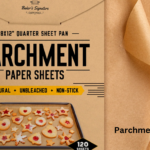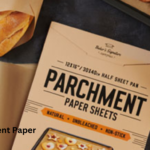Deli paper is a type of lightweight, moisture-resistant paper commonly used in delis, restaurants, and food trucks for wrapping sandwiches, burgers, and other food items. It is designed to keep food fresh while providing a convenient way for customers to grab their meals. The paper typically features a grease-resistant coating, making it ideal for greasy or oily foods.
Characteristics of Deli Paper
Deli paper is known for several characteristics that make it a preferred choice in the food industry:
- Grease Resistance: Deli paper is specially treated to resist grease, preventing the paper from becoming soggy or tearing when wrapped around oily foods.
- Breathability: Unlike plastic wraps, deli paper allows air circulation, which helps maintain the freshness of food items without trapping moisture.
- Durability: Despite being lightweight, deli paper is strong enough to hold various food items without ripping or tearing easily.
- Versatility: Deli paper can be used for various applications, from wrapping sandwiches to lining baskets and trays.
The Role of Deli Paper in the Food Industry
Deli paper plays a crucial role in the food industry, particularly in establishments that serve takeout or fast-casual dining. Here are some key applications:
Sandwich Wrapping
One of the most common uses of deli paper is for wrapping sandwiches. The grease-resistant property ensures that the paper maintains its integrity, keeping the sandwich intact and preventing leaks. This is especially important for loaded sandwiches that contain sauces or oily ingredients.
Food Presentation
In addition to wrapping, deli paper is often used for food presentation. Many restaurants use it to line trays or baskets, providing an attractive and functional surface for serving food. The paper can be easily customized with logos or designs, adding a personal touch to the dining experience.
Takeout Packaging
For businesses focused on takeout, deli paper is an excellent choice for packaging various food items. Its lightweight nature makes it easy to transport, and its ability to keep food fresh ensures customers receive high-quality meals.
Portion Control
Deli paper can also be used for portion control in food preparation. Chefs can easily wrap individual servings of meats, cheeses, or other items, making it easier to manage inventory and reduce waste.
Comparing Deli Paper to Other Food Wrapping Materials
While deli paper is a popular choice, it’s essential to understand how it compares to other wrapping materials like wax paper, butcher paper, and food wrapping paper.
Wax Paper
Wax paper is coated with a thin layer of wax, making it moisture-resistant but not grease-proof. This means that while wax paper can be used for wrapping some food items, it may not be suitable for greasy foods as it can become soggy. Wax paper is often used for baking or food storage, but when it comes to takeaway sandwiches or oily items, deli paper is the better option.

Butcher Paper
Butcher paper is a heavier, more durable paper often used for wrapping meats and fish. It’s designed to withstand moisture and is breathable, making it ideal for storing raw meats. However, butcher paper may not have the same grease resistance as deli paper, making it less suitable for sandwiches or fried foods. While both papers have their uses, deli paper is generally more versatile for a broader range of food items.
Food Wrapping Paper
Food wrapping paper is a broader category that includes various types of paper designed for food packaging. This can include everything from parchment paper to plastic wraps. While food wrapping paper can serve many purposes, deli paper is specifically tailored for the unique needs of delis and food service establishments, offering a combination of grease resistance, durability, and breathability that other types may lack.
Benefits of Using Deli Paper
The use of deli paper comes with several benefits that make it an attractive choice for food service providers:
Cost-Effective
Deli paper is generally more affordable than many other packaging options, allowing businesses to save on costs while maintaining quality. Its lightweight nature means that shipping costs are also reduced, making it an economical choice for food service providers.
Eco-Friendly Options
With growing concerns about environmental sustainability, many manufacturers now offer eco-friendly deli paper options. These papers are made from recycled materials and are biodegradable, making them a responsible choice for environmentally-conscious businesses.
Customization
Deli paper can be easily customized with prints and logos, allowing businesses to enhance their branding. This not only helps in promoting the business but also adds a professional touch to food presentation.
Convenience
The ease of use of deli paper is another significant advantage. It can be easily torn or cut to size, making it simple for staff to wrap food quickly during busy service periods.
Best Practices for Using Deli Paper
To maximize the benefits of deli paper, consider the following best practices:
Choose the Right Size
Selecting the appropriate size of deli paper is essential for effective wrapping. Using paper that is too small can lead to spills and mess, while oversized paper may result in unnecessary waste.
Proper Wrapping Technique
When wrapping food items, ensure that the deli paper is folded neatly and securely. This not only helps keep the food fresh but also enhances the overall presentation.
Storage Conditions
Store deli paper in a cool, dry place to maintain its integrity. Exposure to moisture can compromise its grease-resistant properties, affecting its performance.
Consider Temperature
While deli paper is suitable for a variety of temperatures, it’s essential to consider the type of food being wrapped. For extremely hot items, ensure that the paper can withstand the heat without compromising its structure.
Conclusion
In the world of food packaging, deli paper is an invaluable resource for restaurants, delis, and food trucks. Its unique properties, such as grease resistance, breathability, and durability, make it an ideal choice for a wide range of food applications. When compared to other materials like wax paper, butcher paper, and food wrapping paper, deli paper consistently proves to be more versatile and effective for food service needs.
By understanding the benefits and best practices associated with deli paper, food service providers can enhance their packaging solutions, improve food presentation, and ultimately deliver a better experience for their customers. As the food industry continues to evolve, the importance of quality packaging materials like deli paper will only grow, making it a staple in kitchens and eateries worldwide.







